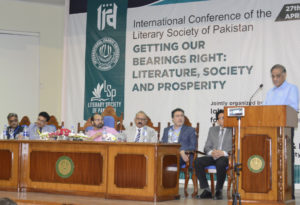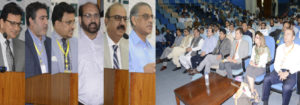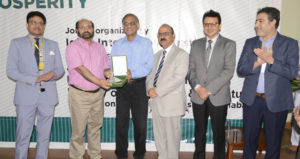 Writing is the most appropriate way of expressing trauma and complications, and I will be the last one to make rules for writing in terms of impression and style, said Arundhati Roy, acclaimed booker winning author and activist in a talk on her novel “ The Ministry of Utmost Happiness” here at International Islamic University Islamabad .
Writing is the most appropriate way of expressing trauma and complications, and I will be the last one to make rules for writing in terms of impression and style, said Arundhati Roy, acclaimed booker winning author and activist in a talk on her novel “ The Ministry of Utmost Happiness” here at International Islamic University Islamabad .
The talk was held (on skype) in a conference on “Getting our bearings right: literature, society and prosperity” organized by the English department of university in collaboration with varsity’s constituent unit Iqbal Institute for research and dialogue (IRD).
“I have always quarreled with this word “activist”. I think it’s a very new word and I don’t know when it was born, but it was recently. I don’t want to have a second profession added to writing.” She said.
To a question about the place and city in the novel, she responded that it’s a book that doesn’t pretend to universalise anything or conceptualise anything. It’s a book of great detail about a place. On a question about her fiction and non-fiction works, she maintained that: I don’t actually see my fiction and nonfiction as extensions of each other.
“this novel has been ten years in the writing, but I think in the twenty years between The God of Small Things and now, I have travelled and been involved with so many things that are happening and written about them at length” she said.
 The conference was attended by as many as 25 national and international speakers other than Roy including Dr. Asif Farrukhi, Dr. Shahid Siddique and many others.
The conference was attended by as many as 25 national and international speakers other than Roy including Dr. Asif Farrukhi, Dr. Shahid Siddique and many others.
The speakers called for a devising a comprehensive policy on adoption of national language and recommended for establishing translation centers at varsities.
Famous writer, critic and Dean of Arts and Humanities at University of Karachi, Dr. Asif Farrukhi in his keynote address stressed to bring regional and Urdu language literature into English, while sharing his views on a case study of reading contemporary Urdu literature from Pakistan based on Asad Muhammad Kha’n’s work, A new harvest of anger. He said historic themes, social and class conflicts as well as contradictions emerge from contemporary Urdu poetry and fiction, often not available in the current syllabi and lead to limited understanding of Pakistani society.
 Dr. Shahid Siddiqui , an educationist and a Dean of Social Sciences, NUML at Islamabad also delivered a keynote address on “ language , life chances and the Matthew effect”. He discussed the gloomy picture of mishandling and inappropriate policies towards adoption of national language. He maintained that literature is a political tool and it is not confined to enjoyment only. He added that language and literature is the best tool to utilize for construction of society and it also determines breaking or making the stereotypes.
Dr. Shahid Siddiqui , an educationist and a Dean of Social Sciences, NUML at Islamabad also delivered a keynote address on “ language , life chances and the Matthew effect”. He discussed the gloomy picture of mishandling and inappropriate policies towards adoption of national language. He maintained that literature is a political tool and it is not confined to enjoyment only. He added that language and literature is the best tool to utilize for construction of society and it also determines breaking or making the stereotypes.
Dr. Tahir Khalily, Vice President Academics at IIUI vowed that conferences of such importance will be part of the activity calendar to determine role of literature in the prosperity and reconstruction of society . He also hailed efforts of the department and IRD for managing to bring best speakers and experts to discuss the theme of conference.
Dr. Ayaz Afsar, Dean of Faculty of Social Sciences said that one of the purposes of the conference is to encourage debate , interaction and networking among the national and international experts and students. “I would like to propose that the goal of the English departments should be reclaiming the primacy of asceticism in literary criticism” he added.
The event was also addressed by Dr. Husn ul Amin, Executive Director, IRD who apprised about the role of IRD in society building. The Arundhati talk, rest of the sessions and discussions were mediated by Dr. Muhammad Sheeraz Dasti, the conference secretary who, earlier, also elaborated the details of sessions. The conference witnessed around 100 papers relevant to the theme of conference.

